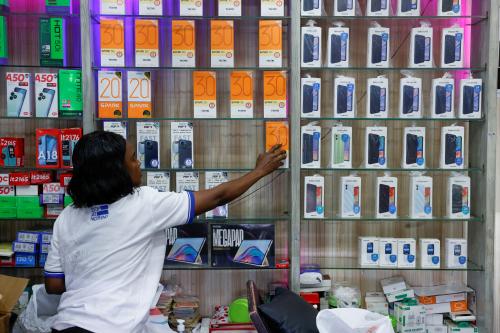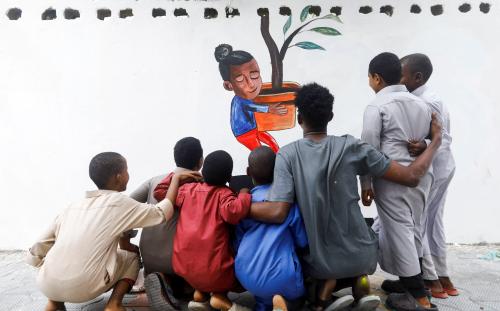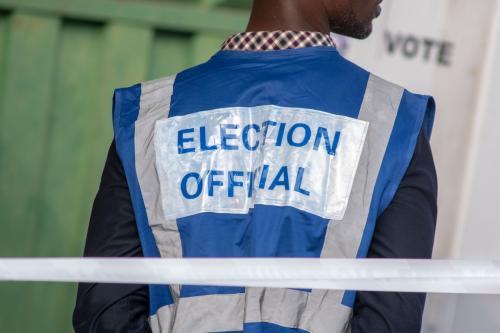The first U.S. patient diagnosed with Ebola, Thomas Eric Duncan, died October 8 in a Dallas hospital where he was being treated. He had recently traveled to and from Liberia, where—along with Sierra Leone, Nigeria, and Guinea—the epidemic is worsening. Brookings experts have offered their analysis and recommendations on the crisis from a variety of angles.
Updated October 16
Big Data Ideas to Help Protect Health Workers
One of the many alarming aspects of the Ebola crisis, says John Villasenor, a nonresident senior fellow in Governance Studies, is the “fact that the U.S. response to date hasn’t fully utilized the statistical and big data tools that could play a vital role in both protecting health workers from exposure and stemming broader spread of the virus in the United States and elsewhere.”
Villasenor offers some ideas for how to use statistical methods and big data to help protect health workers.
Read it here.
Updated October 13
Statistics Say: Don’t Blame Health Care Workers Who Get Ebola
In the wake of a Dallas health care worker who participated in the treatment of Duncan testing positive for Ebola, Villasenor argues that “blaming health workers who contract Ebola sidesteps the statistical elephant in the room.” He explains, using the binomial distribution, that assumptions that everyone will use and remove their protective gear perfectly every time are unrealistic. The result: The laws of probability will eventually catch up as the numbers of contacts between health workers and Ebola patients grows.
Villasenor draws three conclusions: (1) we should avoid assumptions “that the problem lies with health workers and not the protocol for using protective gear”; (2) we should “identify weak links in the protocol”; and (3) we should acknowledge that “there is still a lot we don’t know about Ebola transmission.”
Updated October 10
Invest in Global Public Goods to Defeat Ebola
Nonresident Fellow David Gartner explains why the “only effective strategy for the United States and other countries to defend against Ebola is to invest in the global public goods.” These include disease surveillance, vaccine innovation, and the emergency public health response. Without the failures in all three areas, Gartner argues,
the world would already have an Ebola vaccine, the initial outbreak would not have festered for three months without anyone figuring out what was happening, and a serious global response would not have been delayed by as much as nine months as the epidemic spun out of control.
Read more here.
People Confuse Magnitude and Probability
In an interview on The Joel Riley Morning Show, Senior Fellow Ross Hammond, director of the Center on Social Dynamics and Policy, explained that “People often confuse magnitude and probability,” meaning that “people think that things that have serious consequences like plane crashes or deadly diseases are more likely when they hear about how serious they are.”
Listen:
“But in this case,” Hammond continued, “we have only one case in the U.S. [Mr. Duncan, who died this morning] and there are many things the government can do and is doing to protect Americans. So at the moment I think widespread fear in the U.S. is probably not very helpful.”
While he hasn’t studied the economic effects of the current Ebola epidemic specifically, Hammond co-authored a study in 2009 that estimated the economic costs of closing all U.S. schools in response to the H1N1 virus for four weeks to be between $10 billion and $47 billion. In response to the Ebola outbreak, he called the U.S. government’s decision to impose airport screening but not cancel all flights from affected countries “a nice, balanced approach.” Considering the potential economic costs and inconveniences of any approach, Hammond said, “is really important:
to [both] protect Americans but at the same time to not create lots of economic headaches and it’s also important to remember that this epidemic is very widespread in countries in West Africa and one of the best thing we can do is to protect Americans is to help control the epidemic over there.
On ABCNews.com, Hammond noted that “People become afraid by talking to someone else who is fearful or seeing someone else get the disease,” noting that there are documented instances of fear spreading very rapidly and that they could have consequences that affect consumer behavior and businesses. “When people become afraid of catching a disease, and they change their behavior or keep their kids home from school, or stay home from work or cancel a trip, that of course has economic effects.”
Hammond also explained to Newsweek that quarantining sick patients will be an effective way to shut down the spread of the disease. He also described possible “social distancing” practices that the Centers for Disease Control and Prevention might take to prevent contact between sick and healthy people.
Is the Private Sector Missing in the U.S. Government’s Response?
Witney Schneidman, a nonresident fellow in the Africa Growth Initiative, points to a “hole” in the Obama administration’s coordination effort to combat the disease in West Africa: the Department of Commerce and its link to the U.S. private sector. “The importance of the private sector’s role in responding to health emergencies cannot be underestimated,” Schneidman argues. Noting that the Obama administration has integrated the private sector into key development initiatives in Africa, he writes that the administration:
would do well to establish a similar mechanism as part of its Ebola response. Controlling the spread of Ebola and the development of viable health care systems in the three affected countries will require the sustained engagement of governments, NGOs, international organizations and agencies and the private sector. The sooner that all parties are able to coordinate their efforts the more likely this virus will be controlled.
Read his piece here.
Economic Effects of Ebola in West Africa
“In addition to the enormous and tragic loss of human life,” write Amadou Sy and Amy Copley, “the Ebola epidemic is having devastating effects on these West African economies in a variety of essential sectors by halting trade, hurting agriculture and scaring investors.”
Focusing particularly on Liberia, Sierra Leone, Guinea, and Nigeria, Sy and Copley—a senior fellow and project coordinator, respectively, in the Africa Growth Initiative—examine the epidemic’s impact on mobility, trade and transport, agriculture, mining, tourism, the financial sector, and fiscal policy in these countries. “What is striking about the Ebola outbreak’s effects on the economies of West Africa,” they observe, “is that the most influential factor constraining economic activity there is fear.”
Considering the enormous costs in terms of lives and resources to fight the disease, Sy and Copley remind us that this is not just a West African problem, nor an African problem: “it is a global problem that needs to be addressed at all levels (national, regional and international) as swiftly and completely as possible.”
Read their piece here.
A Military-scale Operation Needed
Calling the Ebola outbreak, “a biological crisis of historic proportions,” Senior Fellow Michael O’Hanlon—director of research in Foreign Policy and the Sydney Stein, Jr. Chair in International Security—and Meena Ahamed, a freelance journalist and member of the U.S. advisory board of Doctors without Borders, called for a “military-scale operation” to combat the epidemic.
They wrote that:
By acting at the appropriate scale and speed, the U.S. and its partners could reduce the risk of this crisis reaching European or American shores. And that is most likely to happen not through the medevacs that recently carried out U.S. missionaries but through unwitting international travelers.
The options are clear: We can act now. Or we can act later at much greater expense and risk to our societies.
Read it here.
Rethinking Critical Infrastructure Security in the Dallas Response
John Villasenor focused on the system’s response to Thomas Duncan’s presentation of his symptoms to the Dallas hospital. “Sending this patient on his way after his first visit to the hospital was clearly a grievous mistake,” Villasenor argues, and “it speaks volumes about the need to rethink how we design the increasingly complex systems used to run not only hospitals but also the power grid, transportation system, financial markets, communications networks, and much more.”
Read his five points on critical infrastructure security as it relates to this case on Forbes.com.
** This post has been updated with the addition of the piece by David Gartner.
p>




Commentary
What Brookings Experts Are Saying about the Ebola Epidemic
October 8, 2014